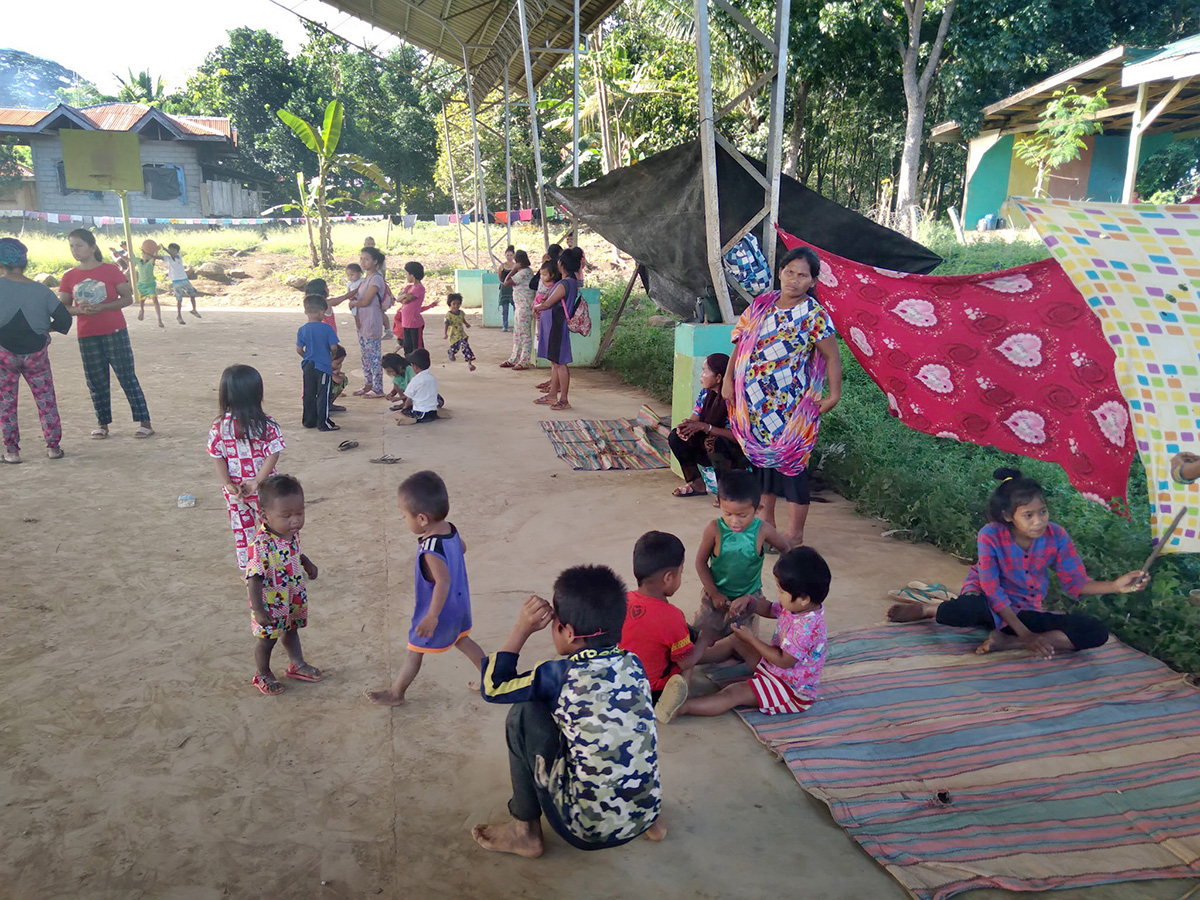United Methodists were forced to evacuate their homes to avoid being caught in the crossfire between Philippine soldiers and insurgents in the Arakan barangay of North Cotabato.
Of the 58 families displaced, 26 are members of Beho Omor United Methodist Church, a Lumad church. The Lumads are the largest indigenous group in the Philippines.
The Rev. Recto Baguio, a National in Mission from the Mindanao Central East district, said the families fled to the covered court of a local elementary school to avoid the violence between the Philippine troops and the New People's Army, the military wing of the Communist Party of the Philippines.
Baguio said the Arakan community is mostly composed of Lumads, the Moro community and Christians. He said the displaced families are facing many difficulties.
“The ordeal is to endure the cold night, especially the little children and the pregnant (women),” he said. “They sleep on the cold paved floor on used cardboard. They were not able to take with them … any bedding to sleep on.
“They are in need of food, sleeping mats, blankets, mosquito nets, medicines, cooking utensils (and) tarpaulin for makeshift tents.”
Baguio said his work includes assisting Lumad churches in developing plans and programs for preservation of values, tradition, beliefs and culture. He also promotes better understanding in cross-cultural contexts among Lumads.
There have been a series of operations lately by the Filipino military due to the allegation that people in the Arakan community are supporters of the New People's Army, Baguio said. United Methodists also have been accused of supporting the rebel group.
Baguio said on Oct. 5-6, the Mindanao Central East District committee on witness had three activities at Beho Omor United Methodist Church: a revival, confirmation class and charge conference.
“On the second day, we were informed that a certain group of people (were) in the church teaching people, accusing that the group is composed of New People’s Army members. They are referring to us — church workers and laity members — who are members of the team of witness committee,” he said.
Bishop Rodolfo A. Juan of the Davao Area urged the people in the region to stay safe and avoid being caught in the middle of the fighting.
“The situation in the Beho Omor community is very critical with the armed encounter of the military forces and the insurgents,” Juan said. “Our church is caught in the crossfire. The members of our congregation are displaced from their work and are in dire need of assistance.
“With President (Rodrigo) Duterte's administration, which is bent on wiping (out) the 51-year-old insurgency issue in the Philippines, many lives are exposed to danger,” he said. “Sadly, our churches are not exempted. There is clear and present danger.”
Juan requested churches in the Davao Area continue to pray for peace and to extend help.
“We will continue to provide safe sanctuaries for all people in need,” Juan said.
Beho Omor United Methodist Church Pastor Lydia Embog said many of the families have returned home, but others remain at the evacuation site because they fear for their lives. Complicating the situation, she said, the Philippine troops have prohibited the Lumads from harvesting corn, which is how they provide for their families.
Glenn L. Castro, lay leader of Mindanao Central East District, said he was saddened by the predicament of those who have been displaced.
“It is indeed hard,” he said. “They live in a far-flung place. The difficulty to get to their place and their poor condition adds to their serious predicament. They don't have water, no electricity, no food, no tent, no basic needs.
“They were so happy when we got there in the evacuation area. We gave simple assistance to help them sustain for a few days.”
Baguio said the Davao Episcopal Area office and the Mindanao Central East District Committee have provided rice, dried fish and beans to families, as well as clothing, but more help is needed.
The district and the Davao Area office extended help to all 58 families.
“We gave relief to all evacuees, both Christians and Muslims,” Castro said, adding that the aid was made possible through the bishop and the Rev. Meriam Joy Flauta, district superintendent.
“I request fellow United Methodists from all over the world to pray for peace and unity and that any help or assistance be extended to our brothers and sisters in Beho Omor United Methodist Church,” Castro said.
Baguio told United Methodist News that the church should strive to be the prime instrument of bringing genuine peace. “Our faith is not confined in the four corners of the church; instead it does its prophetic ministry based on the United Methodist Social Principles.
“Let us continue to embody those Social Principles. That is what our founder John Wesley admonished us to do, for the world is our parish.”
Mangiduyos is a communicator from the Philippines. News media contact: Vicki Brown, news editor, newsdesk@umcom.org or 615-742-5470. To read more United Methodist news, subscribe to the free Daily or Weekly Digests.
Like what you're reading? Support the ministry of UM News! Your support ensures the latest denominational news, dynamic stories and informative articles will continue to connect our global community. Make a tax-deductible donation at ResourceUMC.org/GiveUMCom.




